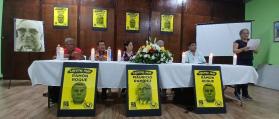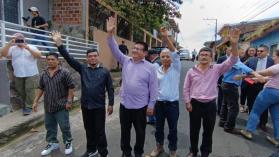Special Report: Incoming President Forges New Regional Ties
Salvador Sánchez Cerén, former leader of the Farabundo Martí National Liberation Front (FMLN) guerilla forces, will assume the presidency of El Salvador on June 1st as the nation’s first head of state to emerge from the ranks of the leftist FMLN party. As the groundwork is laid for the new government’s cabinet, policies and programs, Cerén has been traveling across the region, establishing strategic relationships between the incoming FMLN administration and allied governments from Venezuela and Cuba to the US. The president-elect has indicated a foreign policy shift toward regional alternatives while maintaining necessary ties with the powerful United States, home to nearly 3 million Salvadorans whose remittances remain a principal economic engine for the country.
In April, Cerén spent several days in Cuba, where in addition to meeting with the country’s leadership, he met with two of the freed members of the “Cuban Five,” released in 2011 and 2014 from prison in the United States for espionage. The president-elect also toured Nicaragua, Guatemala, Honduras, Belize, Panama and the Dominican Republic that month, pledging his commitment to further regional integration and cooperation.
On May 2, Sánchez Cerén traveled to Venezuela, where he was received by President Nicolás Maduro. “We have common visions and principles, which is why it is important to make this commitment to continue deepening relations between Venezuela and El Salvador. We have new challenges ahead of us to construct reality from the thoughts of liberator Simon Bolivar and our president Chavez,” Sánchez Cerén affirmed during his visit to one of Latin America’s leaders in building alternative, participatory socialist governance.
While in Venezuela, Sánchez Cerén filed a formal request to join PetroCaribe, an oil purchasing agreement between Venezuela and nearly 20 other Central American and Caribbean nations. In joining PetroCaribe, El Salvador would have 90 days to pay 60% of its oil bill to Venezuela, with 25 years to pay the remaining 40% at 2% interest. Part of the bill can be paid with services or agricultural or industrial products—Nicaragua pays in meat and dairy, while Cuba pays with medical and educational services—, thus opening up an enormous new market for local producers and saving the country between $500-600 million on oil in the first year alone, funds that would be free to finance crucial social investment. El Salvador is expected to sign the agreement as early as June 1st, after which the National Legislative Assembly must ratify it. “You may count on all of Venezuela’s support, through PetroCaribe and the instruments created during this era of rebirth in Latin America, count on our support for your government for the next five years,” Maduro assured Sánchez Cerén.
As the new administration continues to make strides forward in developing socially-minded, sustainable alternatives towards a stronger and more equitable El Salvador, Sánchez Cerén has also emphasized his commitment to maintaining positive relations with the United States, which continues to wield enormous economic and political power over the country. The president-elect spent May 12th in Washington, DC, in meetings with US Secretary of State John Kerry, Assistant Secretary of State for Western Hemisphere Affairs Roberta Jacobson, US Trade Representative Michael Froman and the leadership of the Millennium Challenge Corporation (MCC). US Ambassador to El Salvador Mari Carmen Aponte joined Sánchez Cerén in Washington as well. Sánchez Cerén’s US visit comes in the midst of ongoing negotiations over the disbursement of nearly $300 million to El Salvador in MCC funding, still held hostage by an unending parade of US conditions.
El Salvador’s next FMLN administration promises to widen the path forged by the country’s first progressive government (2009-2014), by reaching out to strategic allies and joining the Latin American shift towards alternative development models. Nevertheless, El Salvador remains constrained by the force of US power, and president-elect Salvador Sánchez Cerén and his incoming administration have taken the shrewd path of delicately balancing strong US ties with new regional alternatives.

 "I am a CISPES supporter because continuing to fight for social justice and a more people-centered country means continuing the dream and sacrifice of thousands of my fellow Salvadorans who died for that vision.” - Padre Carlos, New York City
"I am a CISPES supporter because continuing to fight for social justice and a more people-centered country means continuing the dream and sacrifice of thousands of my fellow Salvadorans who died for that vision.” - Padre Carlos, New York City

